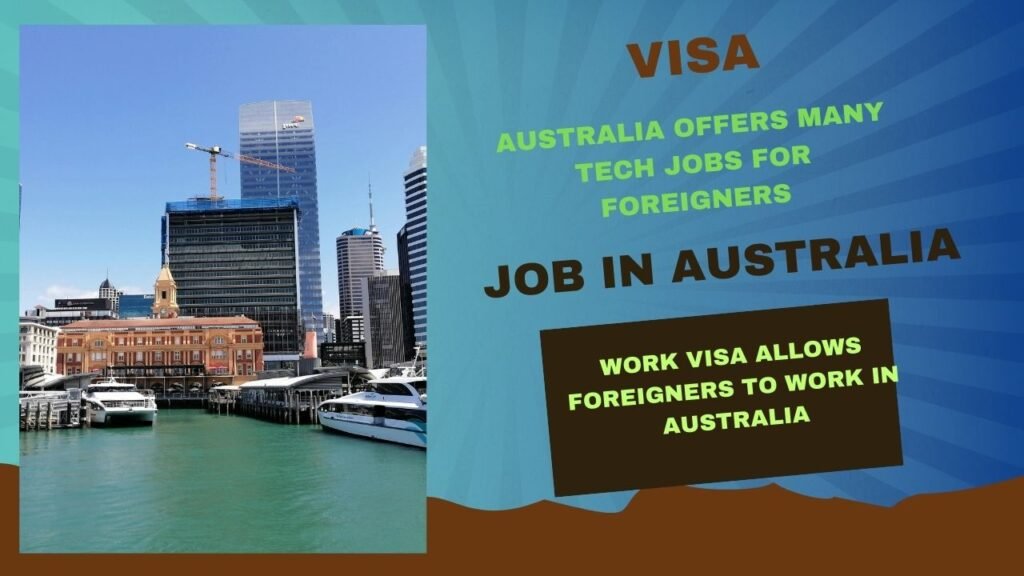Australia offers a wealth of tech job opportunities for foreigners. With a booming tech industry, many companies seek skilled talent from around the world.
The tech sector in Australia is growing rapidly. Cities like Sydney and Melbourne are becoming tech hubs, attracting professionals from various countries. Foreigners can find roles in software development, data analysis, cybersecurity, and more. The demand for tech workers is high, making it a great time to explore job options.
Understanding visa requirements and job markets is essential for a smooth transition. This blog will guide you through the landscape of Australian tech jobs available for foreigners. Get ready to discover the exciting possibilities waiting for you in this vibrant country.
You May Also Like:

Australian Tech Jobs for Foreigners
Table of Contents
Job Market Trends
The job market for tech jobs in Australia is growing. Many companies are hiring skilled workers from abroad. Understanding the trends in this market is key. It helps foreigners know where to find opportunities. Tech jobs are in high demand, especially in big cities. New technologies are changing the landscape every day.
Current Demand
The current demand for tech jobs in Australia is strong. Many sectors seek skilled workers. The following roles are particularly sought after:
- Software Developers
- Data Analysts
- Cybersecurity Experts
- Cloud Engineers
- AI Specialists
According to recent data, the tech industry has seen significant growth. The table below shows the top five tech roles in demand:
| Job Title | Number of Job Openings |
|---|---|
| Software Developer | 25,000+ |
| Data Analyst | 15,000+ |
| Cybersecurity Expert | 10,000+ |
| Cloud Engineer | 8,000+ |
| AI Specialist | 5,000+ |
Companies in Australia value international experience. They often prefer candidates with diverse backgrounds. This trend opens doors for foreigners with tech skills.
Future Projections
The future of tech jobs in Australia looks bright. Predictions show an increase in demand over the next five years. The following factors contribute to this growth:
- Digital Transformation
- Increased Cybersecurity Needs
- Growth in AI Technologies
- Expansion of Cloud Services
According to industry reports, tech job openings may rise by 20% by 2028. The table below shows projected growth for key tech roles:
| Job Title | Projected Growth (%) |
|---|---|
| Software Developer | 22% |
| Data Analyst | 18% |
| Cybersecurity Expert | 25% |
| Cloud Engineer | 30% |
| AI Specialist | 35% |
Companies will need more tech talent as technology evolves. Foreign workers with the right skills will find many opportunities.
VISA Options
Australia offers many tech jobs for foreigners. Understanding visa options is crucial for those seeking work. Different visas allow skilled workers to enter and work in Australia. Two main types are the Skilled Migration Visa and the Temporary Work Visa. Each has unique requirements and benefits.
Skilled Migration VISA
The Skilled Migration Visa is designed for skilled workers. This visa helps fill gaps in the Australian job market. Applicants must have skills in demand. Here are some key points about the Skilled Migration Visa:
- Must meet age, English language, and skill requirements.
- Points-based system evaluates qualifications and work experience.
- Pathway to permanent residency after a period of work.
To apply, candidates need to:
- Submit an Expression of Interest (EOI).
- Receive an invitation to apply.
- Gather necessary documents.
- Submit the visa application.
The visa is divided into several subclasses. Here’s a table showing some popular subclasses:
| Subclass | Description |
|---|---|
| 189 | Skilled Independent Visa |
| 190 | Skilled Nominated Visa |
| 491 | Skilled Work Regional (Provisional) Visa |
Each subclass has specific requirements. Research is essential to find the right one.
Temporary Work VISA
The Temporary Work Visa allows foreigners to work in Australia for a limited time. This visa is useful for short-term employment. It is ideal for those needing immediate job opportunities. Below are some critical aspects of the Temporary Work Visa:
- Usually valid for up to four years.
- Requires sponsorship from an Australian employer.
- Not a pathway to permanent residency.
There are different types of Temporary Work Visas:
- 482 Visa: Skilled Worker Visa, for occupations on the skilled list.
- 485 Visa: Temporary Graduate Visa, for recent graduates.
- 407 Visa: Training Visa, for workplace-based training.
Applying for this visa involves:
- Finding a sponsoring employer.
- Submitting the visa application.
- Providing necessary documents.
This visa is a great option for those wishing to experience working in Australia without a long-term commitment.
Popular Tech Roles
Australia offers many job opportunities in the tech sector. Foreigners with tech skills find it easier to start their careers here. Companies look for talent in various roles. Understanding the popular tech roles helps job seekers focus their efforts. This guide highlights two key areas: Software Development and Data Science.
Software Development
Software development is a top choice for tech workers in Australia. This field includes creating software programs and applications. Many companies need software developers to build and maintain their systems. The demand is high, leading to many job opportunities.
Common software development roles include:
- Frontend Developer
- Backend Developer
- Full Stack Developer
- Mobile App Developer
- DevOps Engineer
Many software developers work in teams. They collaborate with designers, project managers, and other developers. This teamwork helps ensure projects run smoothly. Here are some skills needed in software development:
| Skill | Description |
|---|---|
| Programming Languages | Java, Python, JavaScript, C# |
| Version Control | Using tools like Git to manage code changes |
| Problem-Solving | Finding solutions to technical issues |
| Frameworks | Familiarity with Angular, React, or Node.js |
These skills are essential for success. Many companies offer competitive salaries and benefits for software developers. Understanding job requirements can help applicants stand out.
Data Science
Data science is another popular field in Australia. It involves analyzing data to help companies make informed decisions. The role of a data scientist is crucial. They turn complex data into clear insights. Many industries, such as finance, healthcare, and marketing, need data scientists.
Key roles in data science include:
- Data Analyst
- Data Engineer
- Machine Learning Engineer
- Business Intelligence Analyst
Data scientists work with large datasets. They use statistical methods and machine learning to analyze data. Here are important skills needed in data science:
| Skill | Description |
|---|---|
| Statistical Analysis | Understanding statistics to interpret data |
| Programming Languages | Python and R for data analysis |
| Data Visualization | Using tools like Tableau or Power BI to present data |
| Machine Learning | Building algorithms to make predictions |
Data science roles often offer high salaries. Companies value these skills greatly. Professionals in this field can enjoy a rewarding career in Australia.
Top cities for Tech Jobs
Australia is a land of opportunity for tech professionals from around the world. Many foreigners seek tech jobs in this vibrant country. Top cities for tech jobs offer exciting careers, a supportive community, and a high quality of life. Sydney and Melbourne stand out as prime locations for tech talent. Each city has unique advantages for job seekers.
Sydney
Sydney is Australia’s largest city and a major tech hub. It is home to many startups and established companies. The tech scene here is diverse and rapidly growing.
Key industries in Sydney include:
- Software Development
- Cybersecurity
- Data Science
- Artificial Intelligence
Many global tech firms have offices in Sydney. This creates numerous job opportunities. The average salary for tech jobs in Sydney is competitive. Here is a quick overview:
| Job Title | Average Salary (AUD) |
|---|---|
| Software Engineer | $90,000 |
| Data Analyst | $80,000 |
| Web Developer | $85,000 |
| Cybersecurity Specialist | $95,000 |
Sydney also offers a vibrant lifestyle. It has beautiful beaches, parks, and cultural events. Networking events and meetups are common. These help professionals connect and share ideas. The city’s public transport system is reliable. This makes commuting easy for tech workers.
Melbourne
Melbourne is another top city for tech jobs in Australia. It is known for its strong startup culture. The city supports innovation and creativity. Many tech companies choose Melbourne for their headquarters.
Key sectors in Melbourne include:
- FinTech
- Health Tech
- EdTech
- Digital Marketing
The job market is thriving. Melbourne offers competitive salaries for tech positions. Here is a brief summary:
| Job Title | Average Salary (AUD) |
|---|---|
| Software Engineer | $88,000 |
| Data Scientist | $87,000 |
| UX Designer | $82,000 |
| Mobile App Developer | $90,000 |
Melbourne is famous for its arts and culture. It has great coffee shops and restaurants. This creates a lively atmosphere for tech workers. The city also hosts many tech conferences and workshops. These events provide learning and networking opportunities. Public transport in Melbourne is efficient, making it easy to travel.
Networking Strategies
Australia offers many tech jobs for foreigners. Networking is key to finding these opportunities. Building connections can help you learn about job openings, understand industry trends, and meet potential employers. The right strategies can make a big difference in your job search.
Local Meetups
Local meetups are a great way to connect with others in the tech industry. These events allow you to meet people face-to-face. You can share ideas and learn from others’ experiences. Look for meetups in your area through websites like Meetup.com or Eventbrite. Here are some tips for making the most of local meetups:
- Be open and friendly.
- Prepare a short introduction about yourself.
- Bring business cards to share.
- Follow up with new contacts after the event.
Consider joining groups focused on your specific tech skills. This can lead to more targeted networking. Below is a table of popular tech meetup groups in major Australian cities:
| City | Meetup Group | Focus Area |
|---|---|---|
| Sydney | Sydney Tech Meetup | General Tech |
| Melbourne | Melbourne Developers | Software Development |
| Brisbane | Brisbane Tech Community | Networking & Innovation |
| Perth | Perth Startup Community | Startups & Entrepreneurs |
Online Platforms
Online platforms are essential for networking in the tech industry. They connect you with professionals worldwide. Use platforms like LinkedIn, GitHub, and Stack Overflow to expand your network. Here are some effective strategies for using these platforms:
- Create a strong profile highlighting your skills and experiences.
- Join relevant groups and participate in discussions.
- Share articles and insights to show your expertise.
- Engage with others by commenting and liking their posts.
LinkedIn is particularly useful for job searching. You can follow companies and connect with recruiters. Join industry-specific groups to find more opportunities. Stack Overflow is great for technical discussions and showcasing your skills. Here are some popular online tech communities:
| Platform | Purpose |
|---|---|
| Professional networking and job searching | |
| GitHub | Showcase projects and collaborate with developers |
| Stack Overflow | Ask questions and share knowledge |
Salary Expectations
Australian tech jobs offer great opportunities for foreigners. Many companies seek skilled workers from around the world. Understanding salary expectations is crucial. Salaries vary based on experience and job roles. Here, we explore salary ranges for entry-level and experienced positions.
You May Also Like:
Jobs in Australia for International Students
Entry-level Salaries
Entry-level salaries in the tech industry can differ across roles. Generally, these positions are for graduates or those with minimal experience. Typical entry-level roles include:
- Software Developer
- Data Analyst
- IT Support Specialist
On average, entry-level salaries in Australia start around AUD 55,000 to AUD 70,000 per year. The following table shows average salaries based on different roles:
| Job Title | Average Salary (AUD) |
|---|---|
| Software Developer | 60,000 |
| Data Analyst | 65,000 |
| IT Support Specialist | 55,000 |
Many companies also offer benefits. These may include health insurance, paid leave, and flexible hours. Entry-level positions provide a solid foundation for growth. Many employees receive raises as they gain experience.
Experienced Roles
Experienced roles in tech come with higher salaries. Professionals with several years of experience can earn significantly more. Common experienced roles include:
- Senior Software Engineer
- Project Manager
- Data Scientist
Experienced professionals can expect salaries ranging from AUD 90,000 to AUD 150,000 or more. Here’s a table showing average salaries for these roles:
| Job Title | Average Salary (AUD) |
|---|---|
| Senior Software Engineer | 100,000 |
| Project Manager | 110,000 |
| Data Scientist | 120,000 |
Experienced professionals often receive additional perks. These can include bonuses, stock options, and professional development programs. Job security is typically higher in these positions. Companies value skilled workers who can lead teams and projects.
Cultural Adaptation
Cultural adaptation is key for foreigners seeking tech jobs in Australia. Understanding local customs and workplace dynamics helps in fitting in. Australia has a unique culture that blends friendliness and professionalism. Adapting to this culture can enhance your job experience and social life.
Workplace Culture
The workplace culture in Australia is often described as laid-back yet productive. Here are some important points:
- Informal communication is common.
- Employees value work-life balance.
- Teamwork is highly encouraged.
- Respect for personal space is important.
In many tech companies, you will find open-plan offices. This setup promotes collaboration and communication among team members. It is common for employees to address each other by first names, regardless of position. This creates a friendly atmosphere.
Here’s a comparison of workplace culture in Australia versus other countries:
| Aspect | Australia | USA | Japan |
|---|---|---|---|
| Hierarchy | Flat | Moderate | Strict |
| Communication Style | Direct | Direct | Indirect |
| Work-Life Balance | Strong | Moderate | Weak |
Understanding these differences helps in adapting quickly. Embrace the relaxed style while maintaining professionalism.
Living in Australia
Living in Australia offers a rich cultural experience. The country is known for its diverse population and beautiful landscapes. Cities like Sydney and Melbourne are popular among tech workers.
Here are some key aspects of living in Australia:
- Friendly locals make it easy to meet new people.
- The cost of living can be high in major cities.
- Public transport is reliable and widely used.
- Outdoor activities are plentiful, from beaches to national parks.
Understanding local customs can enhance your daily life. For example, Australians appreciate casual greetings. A simple “G’day” goes a long way. Here are some tips for newcomers:
- Participate in local events and festivals.
- Learn about Australian slang and expressions.
- Explore different regions to appreciate diversity.
Adapting to life in Australia requires openness and curiosity. Embrace new experiences and make connections. This will enrich your journey in the tech industry.
Conclusion
Finding tech jobs in Australia can be a great opportunity. Many companies welcome skilled foreigners. The tech industry is growing fast. People with the right skills are in demand. Researching job openings is key. Networking helps too. Websites and social media can connect you with employers.
Prepare your resume to highlight your skills. Understand visa requirements to work legally. With effort, you can find a rewarding job in Australia’s tech scene. Embrace the journey ahead. Your future in tech could be bright.



